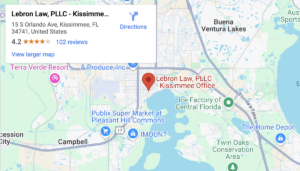Michele A. Lebron | February 20, 2026 | Divorce near Kissimmee, FL
Divorce Statistics, Facts, & What They Mean for You
Divorce seems almost just as common as marriage itself. However, divorce rates have shifted significantly over the past two decades. According to data from the Centers for Disease Control and Prevention, the national divorce rate fell from 4.0 per 1,000 people in 2000 to approximately 2.4 per 1,000 in 2022. The decline reflects several factors, […]
Michele A. Lebron | January 21, 2026 | Family Law Blog
The 4 Phases of the Narcissist Abuse Cycle
Narcissistic abuse rarely begins with cruelty. It often starts with charm and a sense of deep connection that feels almost magical. Over time, however, that warmth is replaced by confusion, self-doubt, and emotional pain. Many survivors describe a repeating pattern known as the narcissistic abuse cycle. Understanding the four phases of narcissism can help victims […]
Michele A. Lebron | January 6, 2026 | Divorce near Kissimmee, FL
Who Is the Affiant When Signing an Affidavit?
Affidavits are a common part of legal proceedings in Florida family law cases. You may be required to complete and sign one in various contexts, including during a divorce matter. However, many people are uncertain about what an affidavit actually is, as well as who the “affiant” refers to when signing one. In simple terms, […]
Michele A. Lebron | January 2, 2026 | Divorce near Kissimmee, FL
5 Reasons Behind the Gray Divorce Phenomenon
Gray divorce refers to divorce among couples aged 50 and older. Over the past few decades, the number of long-term marriages ending later in life has increased. Many couples who once believed they would stay together forever are choosing separate paths. Understanding why gray divorce happens can help people facing this situation feel less alone […]
Michele A. Lebron | December 22, 2025 | Child Custody
Shared Parental Responsibility in Florida
Shared parental responsibility is Florida’s starting point for most custody cases. It means both parents share the right—and duty—to make major decisions for their child. Courts prefer this setup because kids do best when both parents stay involved. But shared responsibility does not always mean a 50/50 schedule. Timesharing is a separate question that the […]
Michele A. Lebron | November 6, 2025 | Divorce near Kissimmee, FL
What Happens if a Spouse Refuses to Sign the Divorce Papers in Kissimmee, Florida?
Divorce is never easy, and sometimes one spouse refuses to cooperate. If your spouse won’t sign the divorce papers in Kissimmee, Florida, you may be wondering if that means you’re stuck. The good news is that Florida law allows you to move forward, even if your spouse doesn’t agree or refuses to participate. The process […]
Michele A. Lebron | October 31, 2025 | Child Custody
Can I Modify My Timesharing Arrangement Without Going to Court in Kissimmee, Florida?
Timesharing arrangements in Florida are designed to give children stability and ensure both parents maintain meaningful relationships with them. However, life can change—new jobs, school schedules, or health concerns may make the original plan difficult to follow. If that happens, you may wonder whether you can adjust your timesharing arrangement without going back to court. […]
Michele A. Lebron | October 17, 2025 | Child Custody
What Is an Ex Parte Custody Order in Florida & When Do You Need One?
When a parent believes their child is in immediate danger, they may not be able to wait for a standard child custody hearing to seek custodial rights over their child. In Florida, the law allows a parent to seek an ex parte custody order that asks the court for emergency custody without notifying the other […]
Michael. A Lebron | October 6, 2025 | Family Law Blog
What’s Attorney-Client Privilege?
If you are working with a lawyer, you may wonder: What exactly is attorney-client privilege? This legal rule is one of the strongest protections in Florida law, and it allows clients to speak freely with their lawyers without fear that private conversations will be revealed in court. The privilege is critical for building trust, sharing […]
Michele A. Lebron | September 30, 2025 | Family Law Blog
Does Florida Recognize Common Law Marriage?
Many people are familiar with common law marriage and assume that living together for a long time in Florida will grant them the same rights as married couples. This is a common misconception, and Florida law has very clear rules on the subject. Florida law does not recognize common law marriage for relationships formed after […]

